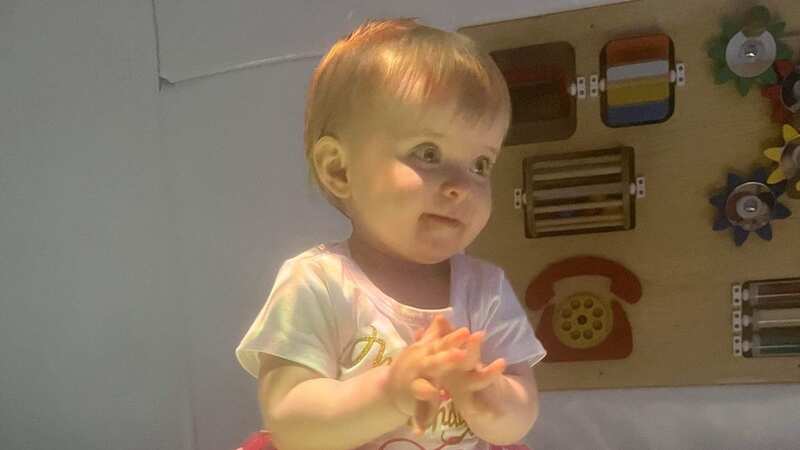Hospital 'missed chances' to spot sepsis which killed girl after first birthday

A report into the care that a one-year-old child received two days after her birthday revealed 'delays' in some elements of her care.
Maddison Rose Patricia Halliday was rushed by ambulance to North Manchester General hospital on October 20 last year after becoming feverish at home. She died the following day after being transferred to the Royal Manchester Children's Hospital.
An inquest into her death has not been held but a clinical case review of the hospital treatment she received has revealed that she contracted sepsis after suffering an ear infection - and that communication issues, 'compounded' by logistical problems - occurred during her treatment. Recommendations have been made to ensure signs of septic shock are spotted earlier, reports Manchester Evening News.
 Maddison became feverish on October 20 last year but died the following day by septic shock (Manchester Evening News WS)
Maddison became feverish on October 20 last year but died the following day by septic shock (Manchester Evening News WS)Septic shock is a severe complication of sepsis in which blood pressure drops to dangerously low levels.
Speaking to MEN last year, father Josh Holliday said: "She was a bouncy child and followed us everywhere. She was very happy and content right from the beginning.
 Cherished girl, 3, who spent half her life in hospital dies before surgery
Cherished girl, 3, who spent half her life in hospital dies before surgery
"She was an absolute joy and loved dancing and singing. She was just amazing and was the happiest child we'd ever met."
Maddison was treated at North Manchester General before she was then rushed to Manchester Children's Hospital and was hooked up to life support. Her parents said she had four cardiac arrests and rapidly deteriorated.
 Father Josh described Maddison as 'amazing' and the 'happiest child' (Vincent Cole - Manchester Evening News)
Father Josh described Maddison as 'amazing' and the 'happiest child' (Vincent Cole - Manchester Evening News)A fundraiser was launched in the wake of the tot’s death to help pay for her funeral, which raised more than £5,000.
The report into the care Maddison received outlined that the child 'quickly developed signs of sepsis' and continued to deteriorate even after her underlying infection was treated with IV antibiotics.
She also did not respond to increasing amounts of medical support, and 'eventually succumbed' to the complications of septic shock and multi-organ failure.
The report concluded that when Maddison began to deteriorate, concerns 'were not immediately escalated' to the Emergency Department (ED) consultant. There was also a delay in the paediatric team answering the bleep that was not escalated up to the ED or Paediatric consultant as per protocol.
The Emergency Department at North Manchester General on the night in question was also reported as 'experiencing a higher than usual volume of patients' with doctors looking after other acutely unwell children, stretching resources.
The report added there had been 'a missed opportunity' for the paediatric team to remain with Maddison in the Paediatric Emergency Department after their 'first review'. However, the team were also dealing with other sick children on the children’s ward and the team felt that Maddison was stable and so left the department.
However, after the 'second review', 'it should have been identified' that Maddison was showing signs of sepsis with low blood pressure, but the paediatric team left the department to return to their work on the paediatric ward as they felt she was stable.
A delay in the insertion of IO needles into Maddison’s bones to allow additional administration of fluid and medications was also reported.
 Boy swallows battery and survives after it stays stuck in his throat for 5 weeks
Boy swallows battery and survives after it stays stuck in his throat for 5 weeks
 She was initially treated at North Manchester General Hospital (Manchester Evening News)
She was initially treated at North Manchester General Hospital (Manchester Evening News)The report concluded that the 'several delays' in Maddison's care at North Manchester General - primarily focused on communication between the paediatric and emergency department teams - along with 'missed opportunities' to request a consultant review from the ED or paediatric team, had been 'compounded' by logistical difficulties related to the technology, equipment availability and competing demands on staff, with multiple unwell children in different locations within the hospital.
The report made 13 recommendations to the hospital following Maddison's death, with a number of actions already taken by the trust in response.
They included that lessons learned from Maddison’s death should be shared with 'all staff involved and the wider teams to ensure future similar patients are recognised earlier and managed differently'.
Recommendations made include:
- Sepsis screening tool and sepsis recognition refresher training for emergency department staff.
- A senior doctor in the emergency department at North Manchester General needs to maintain oversight of critically unwell children, to ensure early recognition of sick or injured children that require senior clinical review. The sick child escalation pathway needs to be followed if there is any delay in paediatric specialty review.
- Refresher training for paediatric emergency department (PED) and paediatric staff on intraosseous needle insertion in children.
- Simulation training to be undertaken by PED and paediatric teams in the management of sepsis, septic shock and the deteriorating child.
- The learning from Maddison’s death to be shared with all staff involved and the wider teams to ensure lessons learnt, and future similar patients are recognised earlier and managed differently.
- A review of all time-critical equipment within the PED to ensure adequate stock.
- Wi-Fi and pager system to be reviewed.
- Doctor and nursing induction to include details on when and how to activate the MHP (Major haemorrhage protocol). Staff refreshers will be provided as part of study days and weekly Departmental Simulation.
- The porters will be given additional training around the process for responding to a MHP call, and their role in collecting and delivering time critical blood products. Refresher days have also been organised for the team.
Read more similar news:
Comments:
comments powered by Disqus

































